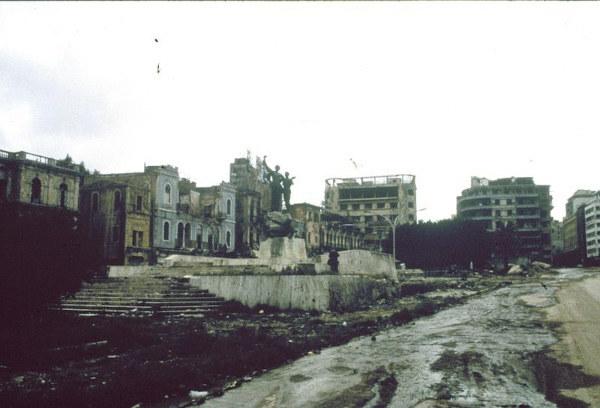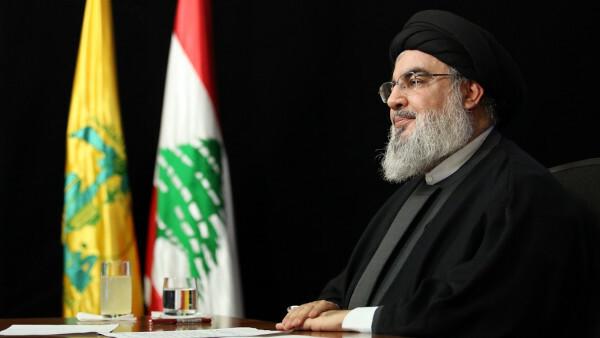O Hezbollah is an Islamic paramilitary group of Shia orientation which emerged during the Lebanese Civil War (1975-1990). Their activities have been recorded since the beginning of the 1980s, but the group only released their manifesto in 1985. Today Hezbollah operates in the political and military fields, being classified by some countries as a terrorist group. The group's objective is to guarantee the independence and sovereignty of Lebanon, with Israel being its main focus of combat.
Read too: Why are Arabs and Israelis in constant conflict?
Topics in this article
- 1 - Summary about Hezbollah
- 2 - What is Hezbollah?
- 3 - Origin of Hezbollah
- 4 - Hezbollah's objectives
- 5 - Hezbollah Ideology
- 6 - How is Hezbollah organized?
- 7 - Military activities of Hezbollah
- 8 - Who finances Hezbollah?
- 9 - Differences between Hezbollah and Hamas
- 10 - Hezbollah's relationship with Brazil
Summary on Hezbollah
Hezbollah is a Shia-oriented Islamic paramilitary group based in Lebanon.
It emerged during the Lebanese Civil War, which lasted from 1975 to 1990.
Some countries, such as the United States, classify the group as a terrorist organization.
The group receives support from Iran and Syria, including funding and arms supplies.
Its objectives are to guarantee Lebanon's sovereignty, removing colonialist influences. Initially, it also aimed to form a State based on Islamic law.
The group has Israel as its main focus of combat.
It is organized politically and militarily, also promoting social and economic actions to help the less favored population in the south of the country, mainly.
Some attacks carried out against Israelis since the 1980s were attributed to the group.
Hezbollah went to war with Israel in 2006, and also acted militarily in the ongoing Syrian Civil War.
What is Hezbollah?
Hezbollah is a political party and a Shia-oriented Islamic paramilitary group that emerged in Lebanon, country in the Middle East, during the civil war that occurred in the early 1980s.
Oname of this organization is derived from Arabic, Ḥizb Allāh, and means “Party of God”. Due to the type of actions engendered by the group, notably in the socioeconomic and infrastructural field of Lebanon, Hezbollah, in international geopolitics, is often described as a kind of parallel state or state within another state (in this case, the Lebanon).
In recent years, Hezbollah's popular support in Lebanon has declined considerably. However, because of its performance as a political party and, in this sense, the support given to Lebanese population by expanding access to public services, such as hospitals and schools, which Hezbollah received approval from a part of the residents of his country of origin. The same cannot be said about the group's vision and acceptance internationally.
As we have seen, Hezbollah has two fronts of action: political and military. Some international agents, such as the European Union, consider only the military segment of Hezbollah to be terrorists.
There are those, however, who classify the entire group as such, regardless of its internal subdivision. You The United States is one of the countries that, since 1997, has classified Hezbollah as a terrorist group. In 2019 and 2020, the United Kingdom and Germany, respectively, also began to consider Hezbollah as a terrorist organization. On the opposite side, there are two countries that support the group, Syria and Iran.
Do not stop now... There's more after the advertising ;)
Origin of Hezbollah

After gaining its independence in 1943, Lebanon went through a long period of turbulence internal, caused by the presence of very different religious groups in its population and the way in which each of them occupied important positions in the country's political framework. Maronite Christians were the largest portion of Lebanon's population, and many of them held political positions in the country. The religious minority was, until then, made up of Muslims, especially Muslims who followed the Shiite trend, and whose presence in the government was reduced.
Even after Lebanon's entry into the Arab League, this situation changed little. With the creation of the State of Israel in 1947, and the subsequent delimitation of the territories corresponding to Palestine, there was an intense flow of Palestinian refugees (Sunni majority Muslims) towards Lebanon. You refugees They settled in the south of the country, but lived in precarious conditions due to the lack of popular support, given that the Christian majority did not accept the Palestinians' permanence in the country.
A escalation of tensions between Christians and Arabs Muslims happened during the 1970s, when an attack in Beirut, carried out by Christians, caused the death of dozens of Palestinians in 1975. In the meantime, the Palestine Liberation Organization (PLO) had established itself in southern Lebanon in 1971, which later resulted in Israel's invasion of that region. Shortly after that, the conflicts of the Lebanese Civil War gained greater dimensions and began to involve other territories. It was in this context that several paramilitary groups emerged, including Hezbollah.
Hezbollah officially began its paramilitary activities in 1985, when it published its manifesto. Still, there are events from the early 1980s attributed to the group. The Party of God, as its name is translated in Arabic, soon received the nickname of extremist for entering into conflict with other Shiite-oriented groups, such as the Amal Movement, which also emerged at the beginning of the Civil War in Lebanon.
Read too: Palestine — data and history of the territory that is not recognized as a State
Hezbollah's goals
Hezbollah aims to removal of colonialist and foreign influences from Lebanon, thus guaranteeing its independence and sovereignty|1| internal. In more specific terms, Hezbollah has in Israel its main enemy since the Israeli invasion carried out in the south of Lebanese territory during the civil war. Furthermore, the group understands that the creation of the State of Israel took part of the lands of the Arab peoples in the Middle East.
Hezbollah ideology
Hezbollah is a paramilitary group that follows the Shiite branch of Islam. In this sense, the organization was largely based on the ideology employed in the government from Iran, a theocratic republic in which politics follows Sharia, Islamic law. Furthermore, this country has established itself as the main Shiite power in the world.
When the group began its activities, the ideology followed by Hezbollah preached the creation of a Muslim state in Lebanon. However, there was an update to the initial manifesto, released in 1985, and from 2009 onwards, Hezbollah began to call for a democratic government that would represent the national unity of Lebanon.
How is Hezbollah organized?
At the end of the Lebanese Civil War, Hezbollah expanded its field of activity into politics, greatly although there was no demilitarization of the group as provided for in the Taife Agreement, which put an end to the conflict. Since then, Hezbollah is organized between a political arm and a military arm. In the political field, Hassan Nasrallah assumed leadership of the group in 1992, after the assassination of his predecessor, Abbas al-Musawi, by Israel.
Hezbollah's leader is responsible for overseeing the Consultative Assembly (Shura), made up of seven members and five sub-councils, including the political, legal and parliamentary assemblies. The group's political arm carries out actions in the economic field, ranging from guidance for agricultural activity in southern Lebanon to raising capital for the group; and also in the social field.
O military branch of Hezbollah is made up of an armed group which carries out actions in Lebanese territory or in neighboring territories, aiming to achieve its objectives and provide arms support to allied countries, such as Syria and Iran.

Hezbollah military activities
Since its inception, Hezbollah has carried out a series of military activities, some of which have been attacks with authorship attributed to the group dating back to 1982, even before its officialization as a group organized. After the establishment of Hezbollah and the end of the Civil War in Lebanon in 1990, the group's military actions included aid to allied countries and clashes with Israel. The two main conflicts in which Hezbollah was involved were:
War between Israel and Hezbollah in 2006, which lasted a month and took place on the border between Lebanese and Israeli territories. The conflict began with the kidnapping of Israeli soldiers who were carrying out cross-border control, and led to an armed response from Israel. The confrontation ended with a ceasefire imposed by the United Nations Security Council (UNSC).
Civil War in Syria, which has continued since 2010. The armed wing of Hezbollah entered this conflict in 2012, having helped in the retaking of Qusayr, in the Ghouta district and also in the partial retaking of Aleppo, the country's capital. In addition, the group provided military assistance with training and financial support to Iran. To learn more about the conflict, click here.
Who finances Hezbollah?
The financing of Hezbollah, with large volumes of capital and weapons, is attributed to countries supporting the Lebanese group, such as the Iran and Syria. The United States Treasury Department also pointed to other means of financing, such as individuals creating a network of shell companies and evading sanctions.|2|
Differences between Hezbollah and Hamas
Due to their military activities, both Hazbollah and Hamas are classified as terrorist groups by some countries, mainly the United States. Both originate from the Middle East and work against the State of Israel.
Hamas |
Hezbollah |
Islamic paramilitary group with a Sunni orientation. |
Islamic paramilitary group with a Shiite orientation. |
It is based in the Gaza Strip (Palestine). |
It is based in Lebanon. |
Responsible for the administration of the Gaza Strip. |
It operates in Lebanon's politics, but does not have full power over the territory. |
It aims to create and formalize the State of Palestine. |
Although one of its initial objectives was the establishment of a State governed by Islamic law, today it works politically in favor of a unitary democracy. |
In addition to Iran and Syria, it has the support of countries such as Iraq, Pakistan, Qatar, Lebanon itself, Kuwait and others. |
It receives support from Iran and Syria. |
Promotes actions to help Palestinian families living in the Gaza Strip and the West Bank. |
Promotes social and economic actions in the country of origin. |
To learn more about Hamas, click here.
Hezbollah's relationship with Brazil
Even though Hezbollah's operations are concentrated in Lebanon and nearby countries, the Brazilian Federal Police managed to identify a link between the paramilitary group and a criminal organization in Brazil.
The investigation found that the operations took place on the border between Brazil, Argentina and Paraguay, and, in exchange for weapons that would be intended for Hezbollah, the Brazilian organization guaranteed protection to Lebanese prisoners in Brazilian territory for the illegal trade of narcotics.|3| According to records analyzed by federal police officers, this “partnership” had been going on since 2006, although the data was only revealed in 2014.
Image credits
[1] Wikimedia Commons
[2]mohammad kassir/ Shutterstock
Grades
|1|MEIRELES, Lucas Esteves de. Hezbollah: Emergence, Conflicts and Transnational Action of the Lebanese Group. In: AGUILAR, Sérgio Luiz Cruz (Ed.). International Conflicts Series, v. 8, no. 5. Marília: OCI, 2021. Available in: https://www.marilia.unesp.br/#!/oci.
|2|G1. Understand how Hezbollah is financed, according to the US.G1, 19 Apr. 2023. Available in: https://g1.globo.com/mundo/noticia/2023/04/19/entenda-como-o-hezbollah-e-financiado-de-acordo-com-os-eua.ghtml.
|3|LEALI, Francisco. Federal Police points out link between Brazilian faction and Hezbollah. O Globo newspaper, 09 Nov. 2014. Available in: https://oglobo.globo.com/politica/policia-federal-aponta-elo-entre-faccao-brasileira-hezbollah-14512269.
Sources
MEIRELES, Lucas Esteves de. Hezbollah: Emergence, Conflicts and Transnational Action of the Lebanese Group. In: AGUILAR, Sérgio Luiz Cruz (Ed.). International Conflicts Series, v. 8, no. 5. Marília: OCI, 2021. Available in: https://www.marilia.unesp.br/#!/oci.
ROBINSON, Kali. What is Hezbollah? Council on Foreign Relations, 25 May. 2022. Available in: https://www.cfr.org/backgrounder/what-hezbollah.
SOUZA, Isabela. Hezbollah: understand everything about the group. Politize, 10 Jan. 2020. Available in: https://www.politize.com.br/hezbollah/.
THE EDITORS OF ENCYCLOPÆDIA BRITANNICA. History & Society: Hezbollah (Lebanese organization).Encyclopaedia Britannica, [2023]. Available in: https://www.britannica.com/topic/Hezbollah.
Would you like to reference this text in a school or academic work? Look:
GUITARRARA, Paloma. "Hezbollah"; Brazil School. Available in: https://brasilescola.uol.com.br/historiag/hezbollah.htm. Accessed on October 17, 2023.
Access the link and find out what Hezbollah is. Understand the context in which this group emerged and its form...
In this class we will see the difference between a circle and a circle. Later, I will teach your...
Dispersion is a system formed by the uniform distribution of one or more substances in...


